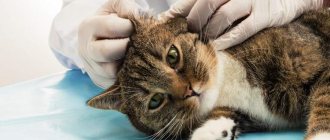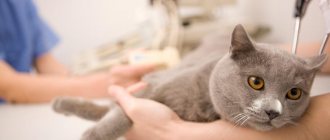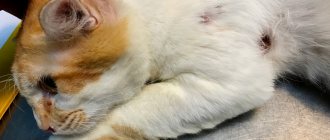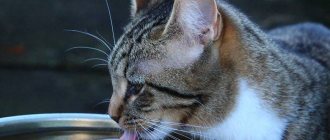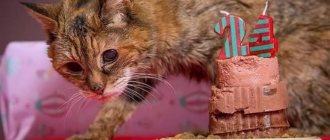No matter how interesting the word halitosis sounds, it means nothing more than a disorder in the pet’s body that characterizes cat breath odor. Ideally, no unpleasant odor should be heard from the mouth of a healthy animal: acetone or ammonia indicate a deviation from the norm.
The mouth of a meowing pet is home to many bacteria, both pathogenic and beneficial. The latter help maintain the normal condition of the oral cavity, inhibiting the growth of bad micro-residents, and a violation of this balance brings not only an unpleasant stench from the mouth, but also health problems.
Causes of bad breath in cats
If suddenly your pet opens its mouth, and from there comes the aroma of the Kraken’s mouth, then you urgently need to figure out why the cat has bad breath:
- Age: most often this attack occurs in young animals aged 1-3 years. If a “charming” amber is heard from an elderly cat, the cause is probably a disruption in the functioning of the internal organs.
- Changing baby teeth to permanent teeth: halitosis in kittens is quite rare, but it does happen during the period of teeth change.
- Oral diseases: gingivitis, caries, pharyngitis, stomatitis, cysts and other diseases often smell bad.
- Breed: Brachycephalic breeds (cats with a flattened face) also often cause their owners to suffer from bad breath.
- Problems with internal organs: diseased kidneys, liver, gastrointestinal tract, upper respiratory tract - any organ can betray its illness in this way.
- Inflammation: Any inflammation, from the lungs to an abscess in the oral cavity, can manifest itself as a stench.
- Helminths: as a result of the activity of bacteria, a cat’s mouth develops a bad odor.
Based on the above reasons, it becomes clear that the pet needs to be examined by a veterinarian.
Common Causes of Halitosis
Very conditionally, the causes that cause halitosis in cats can be divided into four large subgroups. The owner is not always able to diagnose it on his own - sometimes the help of a veterinarian is required.
Diseases of the mouth and teeth
Dental diseases can be both serious and easily solvable conditions:
Stomatitis and gingivitis are inflammatory processes of the gums, palate and inner surface of the cheeks.
An abscess is a closed, encapsulated abscess formed as a result of the entry of a foreign body that provokes inflammation.
Changing teeth in a kitten can cause bacterial growth and, as a result, a bad odor.
Plaque and tartar can cause halitosis.
These problems are easily treated, especially at the initial stage. Plaque and tartar can be avoided through prevention, that is, regular brushing.
Diseases of the nasopharynx
Halitosis is a common accompaniment of polyps in the nasal passages. Once they are removed, the stink disappears.
Mustachioed friends also suffer from such human diseases as sinusitis and sinusitis. The symptoms are similar to a runny nose: discharge from the nose and eyes, frequent sneezing, and sometimes the animal’s temperature rises.
Viral diseases can also manifest themselves, which often cause the death of a pet. At the first alarming signs and lethargic state of your pet, do not be too lazy to go to the veterinarian.
Problems with internal organs
Diseases of internal organs are more common in older animals. Usually the stench occurs when there are problems in the gastrointestinal tract, tumors and neoplasms in the liver, stomach, lungs, etc.
Diabetes in older cats does not promote fresh breath, nor does reverse reflux or pneumonia. Severe conditions require mandatory treatment under the supervision of a specialist.
Parasite infestation
Even an animal that does not leave the apartment should be dewormed (that is, drive away worms). People can carry parasite larvae on their shoes, and if a cat likes to feast on fresh meat or raw river fish, worms can be waiting for it there too.
For individuals walking on the street, veterinarians set a deworming period once a quarter. It is enough to worm your pets once or twice a year, and always two weeks before the annual revaccination. This must be done, because if there are worms, the vaccination may not work or cause serious damage to the pet’s health.
Diagnosis of bad odor from a cat's mouth
global $ads_google;
//data-ad-slot=”2475549904″ $ads_google = empty($ads_google) ? false : true; ?> if ($ads_google == false) {?> $ads_google = true; ?> } ?> By the specific smell coming from the pet’s mouth, you can determine the organ that is malfunctioning:
- Smells of acetone: If your cat smells of acetone from its mouth, and this is accompanied by copious amounts of water, the most likely cause is diabetes. Carbohydrates are not digested, and due to the breakdown of fats, ketone bodies that smell like acetone are formed;
- rotten smell of rot: it makes sense to worm the cat. The cause may also be a disease of the digestive system. The stomach may fail because it cannot cope with the cat’s diet;
- ammonia: problems with the kidneys or other organs of the genitourinary system.
- fishy smell: the probable cause is poor oral hygiene and dental disease.
Whatever the cat’s breath stinks , a veterinarian can identify the true cause and prescribe treatment not for the symptom, but for the disease itself.
Oral diseases
Let us dwell on the pathologies that most often cause an unpleasant odor and require the intervention of a specialist:
Stomatitis
There are several types of the disease. The most dangerous are ulcerative and gangrenous stomatitis. The latter type is accompanied by an extremely unpleasant odor, reminiscent of rotten meat. Stomatitis leads to inflammation of the gums, and with them, in the extreme stage, other parts of the oral cavity such as the tongue and palate suffer.
Obvious signs of the disease include: excessive salivation, abundant plaque on the tongue and gums, redness and swelling of the mucous membrane.
Tartar
This cannot be called a full-fledged disease. Rather, it is a lack of dental hygiene . Leftover food accumulates and gradually rots. Without visiting a veterinarian or cleaning your teeth at home, tartar formation can lead to serious consequences. Bad breath will be the least of your troubles.
How to determine the formation of tartar? Firstly , the gums become red, inflamed, and often bleed. Secondly, the cat tries to relieve the itching and reach the damaged areas with its paw. Thirdly , profuse salivation. Fourthly , in advanced cases, teeth simply fall out.
Glossitis
The disease can cause the already described tartar or the development of pathogenic microorganisms in the oral cavity. One of the most important side effects is that it is painful for the animal to swallow; he refuses any food, and in rare cases, water. The symptoms are generally similar to other dental diseases: bad breath, inflammation of the gums, swelling of the mucous membrane, etc.
Pharyngitis
Accompanied by inflammation of the oral mucosa. It occurs due to the development of microorganisms after damage to the oral cavity . In rare cases, the disease is provoked by the systematic intake of very hot or cold food. Interestingly, pharyngitis is most often recognized by bad breath, because other causes are extremely difficult to recognize without the intervention of a specialist.
Gingivitis
Conventionally, it can be called a type of pharyngitis. Their main difference is in the affected area. Gingivitis develops in a specific area of the mouth. For example, the gums on the left side or part of the back teeth, etc. Unfortunately, the disease progresses quickly and leads to serious illness. In most cases, it can be recognized only by bad breath.
Malocclusion
This point stands apart. It is not classified as a disease. Most often, malocclusion occurs in kittens. It comes in two types. Underbite, when the upper jaw protrudes much further than the lower jaw. But it is quite rare.
An undershot occurs when the lower jaw protrudes slightly compared to the upper jaw. This gives some breeds a certain charm. It is advisable to treat it in infancy. Otherwise, the jaw will be fully formed and it will be more difficult to correct anything.
Some other diseases are also accompanied by bad breath . For example, caries or periodontitis. But this happens much less frequently than in the cases described above.
Reviews from veterinarians about halitosis
Veterinarians often encounter an unpleasant odor from the mouths of cats. The reason for this is often an incorrectly formulated pet diet, which leads to diseases of the stomach, liver, kidneys, and poor oral care of animals.
The owner will definitely be consulted on the proper nutrition of the cat. If the cause of the stench turns out to be poor hygiene, the specialist will recommend brushing the cat’s teeth regularly.
Prevention and oral hygiene
To prevent the development of halitosis, there are a number of recommendations:
Maintain good hygiene. It will be much easier to do this if you teach your pet to brush its teeth daily from childhood.
You should not feed your pet exclusively soft food from pouch bags and pates. A cat is a predator that in nature can eat fish and rodents with bones. Give your animal solid food periodically: you can buy special cookies and treats at pet stores.
If, despite all the measures taken, the kitty still develops tartar, it must be periodically cleaned - on your own or in the office of a veterinarian-dentist.
Visit your veterinarian regularly. Of course, you should not do an endoscopy for preventive purposes, but it is necessary to take tests (urine, general blood test and biochemistry) at least once a year (for the elderly and chronically ill - once every six months). Then you will be able to catch many diseases at an early stage.
The stench from the dog’s mouth is not normal in any case, so if you cannot identify its source during a self-examination, take your pet to the doctor. Most often, halitosis is a consequence of problems in the oral cavity, but it can also indicate more serious diseases. By contacting a doctor in time, you will save your pet’s life, and if nothing threatens it, you will speed up recovery and you will hug your beloved cat without disgust.
The article is for informational purposes only. Contact your veterinarian!
Visit your veterinarian regularly. Of course, you should not do an endoscopy for preventive purposes, but it is necessary to take tests (urine, general blood test and biochemistry) at least once a year (for the elderly and chronically ill - once every six months). Then you will be able to catch many diseases at an early stage.
A cat's bad breath is a vital indicator of its health that should not be overlooked. Normally, the oral cavity of animals does not have any odors, while the presence of stench is a consequence of a certain imbalance in the pet’s body. The reasons may lie both in an incorrect diet and in more global disorders in the functioning of organs. There is no universal way to get rid of a pungent odor, so you must first go through all the tests with your cat that the veterinarian will prescribe. The outcome of further treatment will depend on them. Read on to learn about the causes of bad breath and what types there are.
Treating cat bad breath
You should not listen carefully to the words of your cat-loving neighbor, who cured his purring dog’s mouth stench in some way. The causes of the problem can be completely different, so the first thing you should do is visit a veterinarian: after the appointment, it will be clear on what principle to treat the disease.
If the trouble was caused by an incorrect menu, then the first thing you need to do is balance your diet. The doctor will prescribe medications that will help eliminate the cause.
Problems with metabolism will be revealed by a blood, urine and stool test, as well as a swab of the oral mucosa. An additional symptom will be diarrhea in the cat or rare bowel movements. The diet will require the exclusion of economy-class feed and food from the host’s table.
If diabetes is suspected, it will require lifelong therapy and veterinary supervision.
If problems with internal organs or chronic diseases are indicated, an ultrasound scan or x-ray is taken.
Sometimes it is difficult to independently assess the condition of the oral cavity, so the cat is shown to a specialist: if periodontitis, tumors, caries, or excessively grown tartar are detected, qualified treatment methods will be taken.
Symptoms associated with the problem
Rarely does the stench appear on its own. Usually it is accompanied by various symptoms, which are noticed by an attentive owner. Based on the overall picture, one can assume a specific disease and direct efforts to identify it. This will save time and allow effective treatment to begin as quickly as possible.
Suppuration
The presence of purulent discharge requires determining the location of the abscess. With current pus, most likely there is a ruptured abscess. It can be caused by injuries to the mucous membranes, pulpitis, caries. Purulent processes require rinsing and treatment with antibiotics in most cases.
Brown discharge
If you don’t know why your cat’s breath stinks, but you see brown discharge coming from its mouth, the first thing you need to do is rule out injury. Ichure and caked blood have a brown tint.
If there are no injuries, but there is discharge, then it can be assumed to be calcivirosis. The settled virus causes the appearance of bleeding ulcers and ulcerative stomatitis in general, and its companions will be a brownish discharge and a putrid stench.
Excessive drooling
Increased salivation is also a sign of stomatitis. If your still “dry” cat has suddenly become like a bulldog in terms of drooling -
look for ulcers on the mucous membranes. This could be either ordinary gingivitis or dangerous calcivirosis.
Dental problems
Animals have the same dental problems as people. Pulpitis, caries, abscess, tartar - all this can cause an unpleasant odor to come from a cat’s mouth. When kittens replace their baby teeth, wounds remain in the place where the fangs fell out, and bacteria can multiply in them. In mild cases, rinsing helps, in severe cases, you need to go to the doctor and ask to be prescribed a course of medications.
We recommend reading: A cat licks his peepi and at the same time yells what’s that
How to remove odor from a cat's mouth
In the case where the cause of a cat’s bad breath is a disease of the cat’s mucous membrane or tartar, then you can cope on your own: brushes and gels can and should be purchased at the veterinary pharmacy that can and should be used to clean the cat’s teeth. It is better to accustom your pet to cleaning from childhood, but if the moment is missed, you will still have to start.
If the examination reveals wounds, then they must be regularly treated with miramistin or hydrogen peroxide 3%: after such simple steps, there is a chance that the cat will have much less bad breath if the cause is wounds or diseases of the oral cavity.
Remedies for cat bad breath
global $ads_google;
//data-ad-slot=”2475549904″ $ads_google = empty($ads_google) ? false : true; ?> if ($ads_google == false) {?> $ads_google = true; ?> } ?> There are several remedies that can help if your cat’s breath stinks.
Fresh Breath Tablets - Beafar company offers products containing chlorophyll. The medicine acts as a disinfectant on the mucous membranes of the mouth and is easily combined with food. The pet is given 2 tablets per day, one in the morning feeding, the second in the evening. The pack contains 40 tablets, the price of the medicine is about 500-800 rubles.
Another product with a lot of positive reviews is called Api-San spray or gel “Zubastic”. The medicine costs about 200-250 rubles. Instructions for use: apply the product only from the factory bottle 2-3 times a day for one or two weeks. Since the animal will experience profuse salivation in the first half hour, food is offered no earlier than 30 minutes after treatment.
Mouth Odor Control Spray is suitable for use on cats. The medication acts by destroying tartar, whitening teeth and strengthening gums. The stench that appears due to lack of oral hygiene is eliminated without harm to the animal’s health. You can spend about 200-250 rubles on the drug Cliny.
Gel Dentavedin is an anti-inflammatory and disinfectant for the care of the oral cavity in cats. By combating gram negative/positive bacteria, yeast and dermaphytes. The gel is rubbed into the gums and teeth. Feed the pussy only half an hour after the procedure. The cost of the drug is on average 70 rubles.
Timely care of the animal’s health will prevent the appearance of a bad odor from the pet’s mouth.
Tips and tricks for preventive care
To eliminate bad breath from a kitten, it is recommended:
- use a special brush for brushing teeth, which can be purchased at a pet store, and accustom the animal to hygiene (this will take about 3 months);
- add solid foods to your diet to naturally remove food debris between your teeth;
- remove tartar with ultrasound;
- take proper care of your pet;
- carry out treatment in a timely manner:
- Visit your veterinarian regularly.
When a kitten cannot be shown to a specialist, you need to examine its mouth yourself. If there is any foreign particle there, then it is removed, because it may begin to rot. The specific smell of acetone or rot and signs of disease development are a reason to consult a doctor.
In order not to think about what to do if an unpleasant odor appears, it is recommended to carefully monitor the kitten’s condition. You cannot prescribe and carry out treatment measures yourself.
Such different smells
Have you found out that the animal does not have diseases of the oral cavity or teeth, but the cat’s breath stinks, for example, of fish? What to do? Most likely, his kidneys hurt or his genitourinary system is unhealthy; his intestines or stomach may also be affected.
- If a cat has kidney problems, then an ammonia smell will be heard from the mouth, reminiscent of the amber of urine.
- If your pet has liver pain, then the mouth will “smell” with liver odors, thick and slightly sweet.
- If you have diabetes, there will be an odor reminiscent of acetone, comparable to rotten apples.
- If the smell resembles the stench of rotten meat and stinks of rotting, then the cat has a diseased stomach, intestines or esophagus.
In any case, if your pet’s mouth begins to smell not very pleasant, this may be a reason to visit the veterinarian.
Don't let bad breath go unnoticed: it won't go away on its own, and only an experienced doctor can help your pet.
Causes
For treatment to be effective, it is necessary to understand the reason (the underlying disease) that is causing your pet’s bad breath. Scientifically, this phenomenon is called halitosis. The smell is formed due to the active proliferation of pathogenic bacteria. The process is caused by a disease of the oral cavity and pharynx or a malfunction of the internal organs.
Cleaning a cat's teeth
Thus, the first group of factors includes:
- dental diseases (caries, tartar, pulpitis, osteomyelitis);
- inflammation of the gums (eg due to periodontal disease);
- malocclusion;
- mechanical damage to oral tissues;
- sores;
- stomatitis;
- gingivitis;
- pharyngitis.
The second category of causes includes diseases of internal organs:
- diabetes;
- helminthiasis;
- tumors;
- disruption of the digestive system;
- renal failure;
- tracheitis;
- bronchitis;
- pneumonia.
A kitten's bad breath can be of different types (that is, character and intensity), which depends on the specific disease. On this basis, a preliminary diagnosis is made. The final identification of the cause is made by a veterinarian.
Caries in a cat
Types of unpleasant odor include:
- Smell of acetone. Indicates that the cat has diabetes . A related symptom is large amounts of fluid consumption. Due to disruption of internal organs, carbohydrate metabolism is replaced by fat. During this process, ketone bodies are formed, which give the animal's breath an acetone tint.
- If a cat or kitten's breath smells like rot , this indicates problems with the digestive system , helminthiasis or diseases of the oral cavity . A similar smell is characteristic of dental pathologies (caries, periodontitis). If your cat's breath smells like rotten meat and uncontrollable drooling is observed as a concomitant symptom, we are talking about stomatitis or a viral infection.
- A thick, sweetish fruity smell indicates liver problems .
- Ammoniacal. Indicates disease of the kidneys and genitourinary system .


